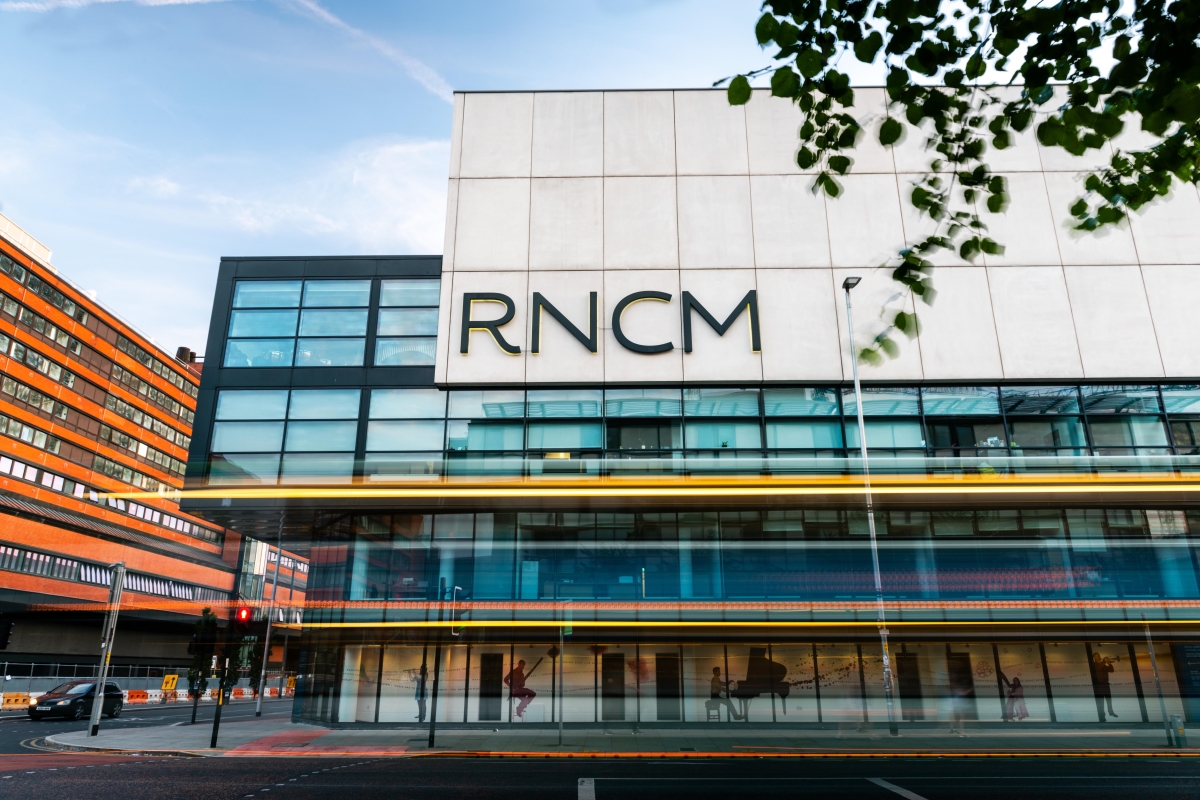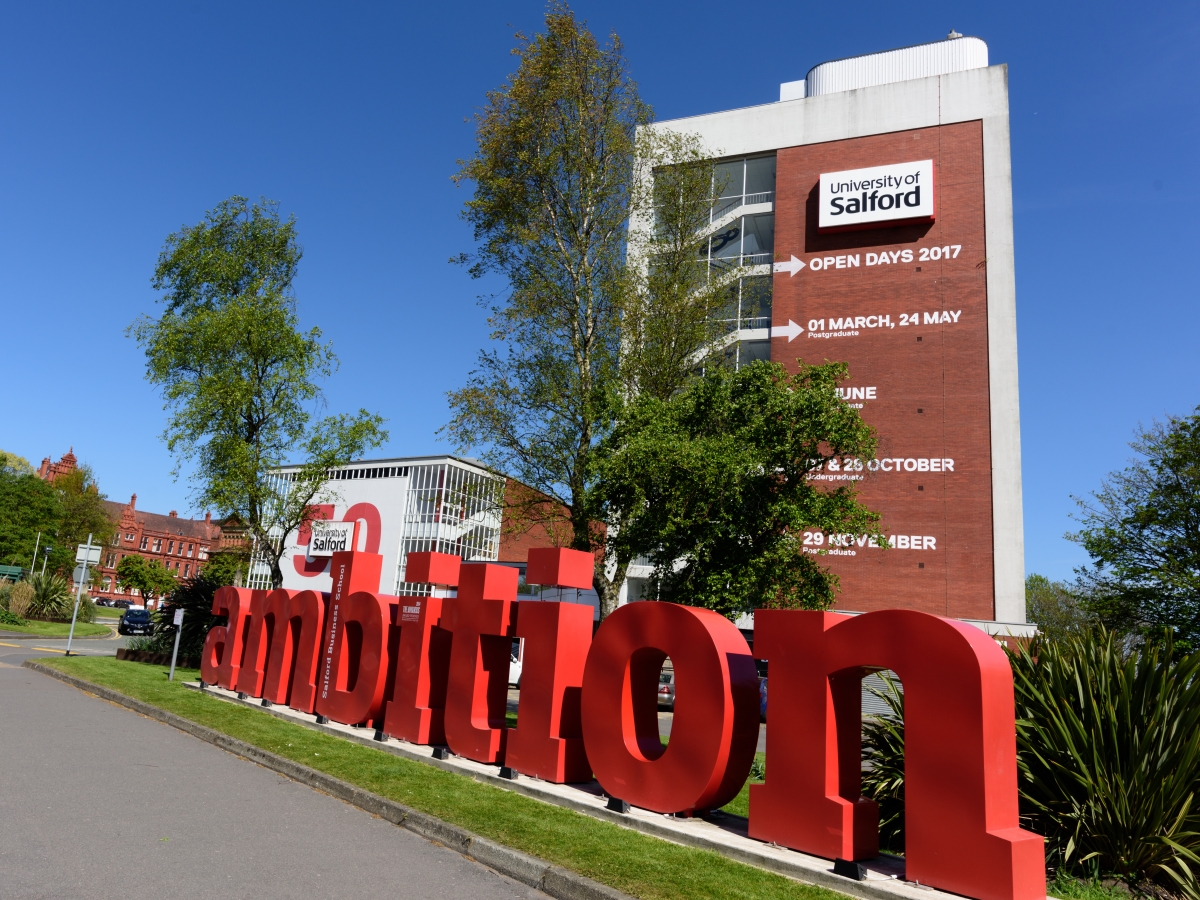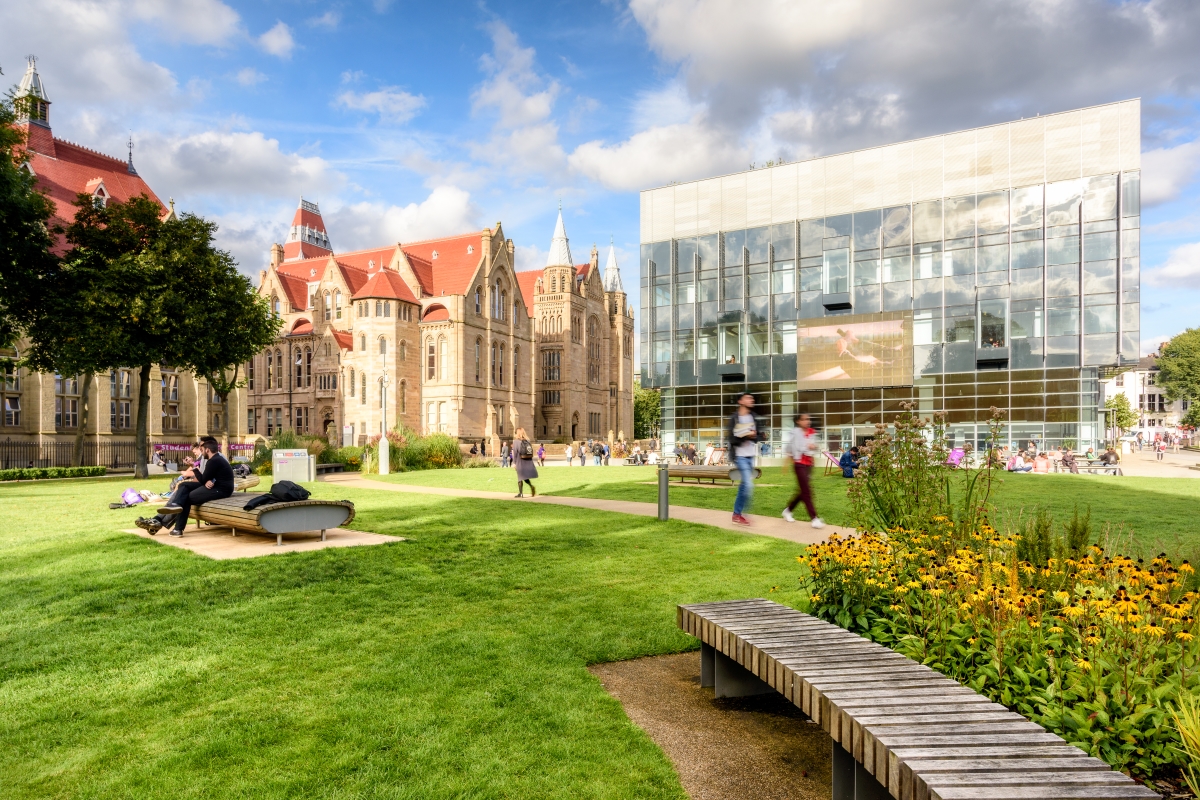Insights
RNCM receives £3.4million from Public Sector Decarbonisation Scheme in partnership with GMCA
The Royal Northern College of Music (RNCM) has been awarded £3.4million from the Public Sector Decarbonisation Scheme (PSDS), working in partnership with the Greater Manchester Combined Authority (GMCA) and funded by Salix.
The significant grant – part of the £78million GMCA has distributed to organisations across the region following a successful bid to the PSDS – provides an incredible opportunity for the College to vastly improve the quality and efficiency of its estate and develop a forward strategy around the route to decarbonisation.
Managed by the RNCM’s Operations Team in collaboration with a range of external consultants, the Salix project is already underway, with full completion set for March 2022.
Key projects to be delivered include air source heat pump technology, a full roof replacement of the main building to improve its thermal efficiency, the installation of a solar PV array to generate electricity, high-efficiency chiller technology with heat recovery, a new efficient transformer for the main building and the development of a new energy metering infrastructure to monitor and verify the effect that the technologies will have around decarbonisation of the institution. These practical projects will be supported by the development of a Heat Decarbonisation Plan, which will outline a strategy to deliver a pathway to zero carbon.
Students Beth Machell and Hoda Jahanpour, said:
‘We are so excited for the completion of the Decarbonisation Scheme at the RNCM. Two years ago, we founded RNCM Climate Action, a society with the aim of helping students and staff live more sustainably and for our college to become more environmentally friendly. One year ago, we organised a UK conservatoire-wide climate strike seeking change in our institutions. It means so much to us that student voices are heard at the RNCM. We look forward to working with college further and hope other conservatoires will follow the lead.’
The RNCM has already made significant steps to reduce its carbon footprint and is fully committed to continuing progress. Over the past few years, its Conference and Catering Department has implemented changes such as replacing plastic packaging, containers, glasses and cups with 100% recyclable material, swapping plastic cutlery for wooden options, buying produce from local suppliers, and recycling all cooking oil to make bio-fuel. Now, thanks to this substantial funding, the College is in a position to reduce its footprint further, with some changes set to lower annual energy usage by 41%.
Cllr Neil Emmott, GMCA Lead for the Green City-Region, said:
‘Tackling the climate emergency requires bold and meaningful change at every level, and from all of us. Greater Manchester’s Five-Year Environment Plan set a target of becoming a carbon-neutral city-region by 2038, and to meet our goals it is essential that the public sector leads the way and demonstrates what can be achieved.’
Achieving green economic growth was identified as a priority in the Greater Manchester Economic Vision and is supporting Greater Manchester’s ambition to achieve net carbon neutrality by 2038.

The Royal Northern College of Music
BBC Children in Need and Comic Relief move to Salford
The BBC is providing a further boost for the digital and creative sector in Greater Manchester by moving the production of BBC Children In Need and Comic Relief to MediaCity in Salford.
These special television events, broadcast live on BBC One and made by BBC Studios Entertainment Productions, are two of the biggest nights in the BBC’s calendar.
BBC Children in Need is the BBC’s UK corporate charity that exists to change the lives of children and young people across the UK and Comic Relief is a major UK charity with a vision of a just world, free from poverty, with both of these charity appeals culminating in a live TV broadcast on BBC One.
Beginning in November with BBC Children in Need, the live show will come from Dock10, the biggest multi-camera purpose-built TV studio in the UK.
Comic Relief’s Red Nose Day broadcast will also come from Salford. Salford has been home to The Sport Relief show in aid of the same charity for several years.
Salford is already home to some of the biggest and best-known programmes on the BBC including A Question of Sport, Dragons’ Den, Football Focus, Match of the Day, University Challenge, BBC Breakfast, North West Tonight, BBC Radio Manchester and Blue Peter, with BBC Children in Need and Comic Relief’s Red Nose Day now also making Salford their new permanent production base and broadcast location.
The move of these additional major shows to Salford will also further enhance the BBC’s commitment to the nations and regions, as outlined in the proposals set out by the Director-General in the BBC’s blueprint for the future entitled The BBC Across the UK.
Greater Manchester is building on a fast-growing £5bn digital economy and 2021 marks the tenth year of BBC operations at MediaCity, which is also home to ITV, the University of Salford and tech businesses including TalkTalk and Tech Mahindra.
The economic impact of the BBC’s move to MediaCity was highlighted in a report from KPMG earlier this year.

MediaCity in Salford
Material Gains: GMLEP white paper sets out future vision for Greater Manchester
What is the future for global cities and how is innovation in advanced materials shaping a world which is greener, better connected, and more equal?
A new white paper from the Greater Manchester Local Enterprise Partnership has been published to answer the big questions around the future of our cities.
‘Material Gains: Building Better Cities for People and the Planet’ imagines Greater Manchester in 2038 – a city-region enabled by low carbon economic growth, aided by advanced materials and initiatives benefiting the Northern community with socio-economic benefits.
The futuristic vision includes the views of leading commentators from the fields of science, industry, and academia, including voices from The University of Manchester, MIDAS, Graphene@Manchester, and two businesses innovating in the region.
In a foreword, Chair of the Greater Manchester Local Enterprise Partnership, Lou Cordwell, outlines the collective vision for the future as set out by the panellists:
“By 2038, they suggest a future of vertical urban farms; rainwater purification units utilising graphene membranes; road surfaces which defy potholes and charge the batteries in the driverless lightweight vehicles which pass along them.
“The air is clean, and people have vast array of career opportunities in innovative industries that have not yet been imagined. Transportation is net carbon neutral, integrated, affordable and efficient. The cityscape remains familiar but incredible new architectural structures are possible due to enhance building materials.”
The document captures some of the insight and intelligence provided by key thinkers and is intended to stimulate further conversation about Greater Manchester’s role in influencing the future for global cities, imagining a new future of skilled jobs and economic benefits.
The white paper includes a new illustration from Manchester illustrator Barney Ibbotson, detailing some of the changes we might see in the city region by 2038. It was produced in partnership with MIDAS, Greater Manchester inward investment agency, and Graphene@Manchester, part of The University of Manchester.
To read ‘Material Gains: Building Better Cities for People and the Planet’ in full, click here.
‘Material Gains: Building Better Cities for People and the Planet’ is also available as a flipbook.
Salford up nine places in Complete University Guide League table
The University of Salford has risen nine places in the Complete University Guide 2022 from 92nd to 83rd out of 130 institutions.
Across subject areas, the University’s ranking has improved in just over two-thirds of the subject tables, with nine subjects where we are in the top 50% of the subject table and improving rank on last year. These subjects are Medical Technology & Bioengineering, Music, Architecture, Sociology, Art & Design, Counselling Psychotherapy & Occupational Therapy, Geography & Environmental Science, Computer Science and Marketing – which is the best performer, ranking 25th out of 92 and rising 50 places.
Dr Sam Grogan, Pro Vice-Chancellor Student Experience at the University of Salford, commented:
“Given all of the ongoing challenges of the past year this improvement is really pleasing and I would like to sincerely thank all colleagues for the work that they have done. The gains that we have made show that, although we still have a long way to go, we are moving in the right direction.”
The Complete University Guide rankings are based on ten measures: Student Satisfaction, Research Quality, Research Intensity, Entry Standards, Student: Staff ratio; Spending on Academic Services; Spending on Facilities; Graduate Prospects Outcomes; Graduate Prospects on Track, and Degree Completion.
Read more about The University of Salford here.

The University of Salford
Annual report reveals acceleration of Health Innovation Manchester’s work
The report examines how HInM played a role as an integrated academic health science and innovation system, working on behalf of the Greater Manchester city region.
Health innovation is among Greater Manchester’s frontier sector strengths identified with the Greater Manchester Economic Vision and the Greater Manchester Local Industrial Strategy.
HInM’s interactive report, titled “Accelerating Health Innovation during COVID-19”, features thought-leadership pieces from the executive team, project case studies and impact data from the past 12 months.
It features information across the different pillars of HInM’s work:
- Digital Disrupters – including accelerating vital data sharing through the GM Care Record, the rollout of a UK-first COVID-19 tracker for care homes and creation of the Smokefree Pregnancy digital platform
- Health and Care Catalysts – including HInM’s role in a Greater Manchester-wide response to mental health, remotely monitoring patients through COVID Oximetry @Home and supporting pregnant women at risk of pre-eclampsia. It also features HInM’s work as an Academic Health Science Network (AHSN) and collaborating as part of the national AHSN Network.
- Groundbreaking Researchers – including supporting the Greater Manchester Research Rapid Response Group to unite clinical and academic COVID-19 research. It also features updates from the Manchester Academic Health Science Centre (MAHSC) domains and the NIHR Applied Research Collaboration Greater Manchester research themes.
- Industry partners – including support offered to SMEs, work undertaken as part of European Regional Development Fund (ERDF) programmes, the latest successful Momentum Fund winners and the launch of the Greater Manchester Research and Innovation Health Accelerator Programme.
- Public and Community Involvement and Engagement – including how HInM works with PCIE groups and wider networks to ensure that the voices and lived experiences of local people are the heart of research and innovation.
- The Utilisation Management Unit – including the support provided to urgent and emergency care coordination across Greater Manchester and facilitating learning and improvements during the COVID-19 pandemic.
- HInM’s commitment to equality, diversion and inclusion also features, as does an updated on the innovation pipeline approach, governance and finance.
Professor Ben Bridgewater, Chief Executive of Health Innovation Manchester, said:
“As the pandemic progressed in the first few months of 2020 and began to significantly impact our NHS and care services, we needed to rapidly mobilise and play an integral part of the COVID-19 response. Health Innovation Manchester has worked hard to stand up and play its part in this as an integrated academic health science and innovation system, working on behalf of the Greater Manchester city region.”
He continued: “We would like to thank all our partners for their cooperation and collaboration during the pandemic, as well as continuing to share vital learnings and insights in order for us to constantly improve and develop as a system.”
Health Innovation Manchester annual impact report – 2020 to 2021 is available here.
Greater Manchester at the leading edge of Precision Health – Health Innovation Manchester
Senior leaders join Northern Gritstone investment company
Two of the UK’s most respected business leaders have joined the senior management team of the new investment company designed to maximise the impact and commercialisation of university research and development in the north of England.
Lord Jim O’Neill and Duncan Johnson will serve respectively as Non-Executive Chairman and Chief Executive of Northern Gritstone, founded by the Universities of Leeds, Manchester and Sheffield to facilitate the commercialisation of university science and technology-related Intellectual Property in the north of England.
Lord O’Neill will assume key responsibilities helping to establish the exciting future for Northern Gritstone.
He has been immersed in many matters related to the Northern Powerhouse in recent years, having Chaired the Cities Growth Commission in 2013-14, and going on to help the government implement its Northern Powerhouse strategy as Commercial Secretary to the Treasury in 2015-16. He is currently Vice-Chair of the Northern Powerhouse Partnership.
Lord O’Neill has nearly 40 years’ experience in capital markets and financial services, being best known for his near 20 years as a partner at Goldman Sachs, where he was Chairman of GSAM, after previously being the firm’s Chief Economist.
Duncan Johnson joins Northern Gritstone as Chief Executive Officer from Caledonia Investments, the FTSE 250-listed investment trust, where he was Head of Caledonia Private Capital for the past decade. Prior to this, Duncan was a Founding Partner at RJD Partners, a lower and mid-market UK private equity fund manager.
Lord O’Neill, Chairman, Northern Gritstone, said:
“From the Industrial Revolution through to the early Digital Revolution, the North has helped to power our nation’s history. Gritstone’s mission is to take this one step further and unlock the huge commercial opportunity of our science and technology capabilities.
“For many years, while the region has often been a leader in new inventions – from Healthtech to Artificial Intelligence and Analytics, Advanced Manufacturing, Life and Biosciences – it has yet to progress these into larger, successful businesses, employing more people in higher paying jobs. Universities in the North, historically, have raised only a fraction of the funding achieved by others. More long-term capital to help foster and develop emerging technologies is at the centre of what is needed to determine long-term success for the Northern Powerhouse.
“I am a passionate believer that the North needs to boost its productivity, helping the country to achieve a stronger trend rate of sustainable growth, and one that is more equitable and inclusive of more regions. The concept and ambition of Gritstone sits firmly with much of what I have tried to encourage in recent years, and its introduction should help further the momentum emerging in the north of England. Our ambition is to act, in partnership with the Founding Universities, as a powerful catalyst for innovation to help drive a new era of commercial success across the North.”
Duncan Johnson, Chief Executive, Northern Gritstone, said:
“I am honoured and delighted to be leading Northern Gritstone. Our ambition is to drive returns by establishing a world leading ecosystem of support and funding, built upon the concepts and inventions that the Founding Universities and the Company’s other partners, have developed.
“I have been particularly impressed with how the firm has brought together a highly experienced team which blends deep investment management with business building expertise, all united by a core belief that profitable organisations delivering top quartile returns to shareholders should have a wider societal purpose.
“Jim and I will be working closely together to grow Northern Gritstone’s origination platform and build on our long-term partnerships with the Founding Universities to deliver the latent potential that so evidently exists.
“The current strong pipeline of academic spin-outs provides a unique opportunity for investors to support and participate in the substantial growth of IP rich companies in the North.”
Commenting on the appointment of the leadership team, Professor Simone Buitendijk, Vice-Chancellor of the University of Leeds, Professor Dame Nancy Rothwell, GM LEP board member and President & Vice-Chancellor of the University of Manchester and Professor Koen Lamberts, President & Vice-Chancellor of the University of Sheffield said:
“We are excited to have created Northern Gritstone. The investment it is attracting will transform our capacity to develop – at pace – our pipeline of excellent spin-out opportunities for the benefit of the Northern Powerhouse economy.
“To be able to attract such a high-quality leadership team is testament to the strong track record of our universities as engines of innovation – by collaborating and commercialising our world-class research we can create real impact and tackle global challenges. We welcome Jim and Duncan on board and look forward to great success over the coming years.”

The University of Manchester

